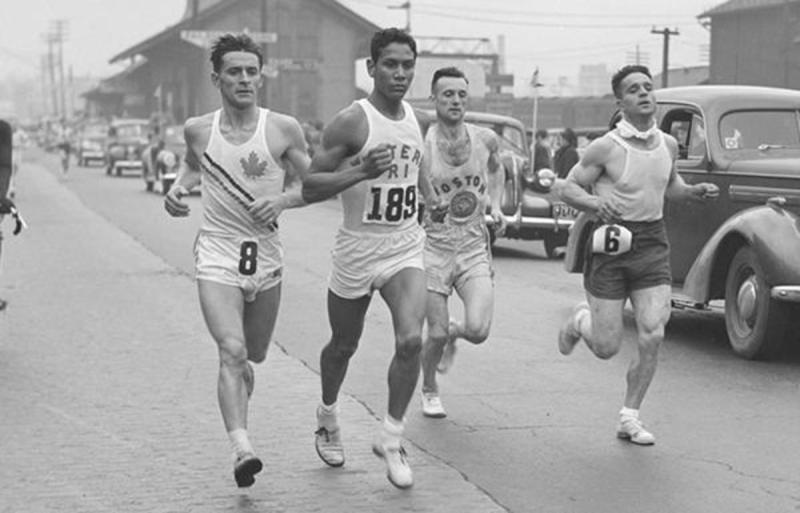Marathon paying tribute to Indigenous champion - Indian Country Today
By: Indian Country Today



Narragansett citizen Ellison "Tarzan" Brown won the Boston Marathon twice Author: The Associated Press
Ellison 'Tarzan' Brown running in the 1939 Boston Marathon. Courtesy of the Boston Public Library, Leslie Jones Collection.
Narragansett citizen Ellison "Tarzan" Brown won the Boston Marathon twice
William J. Kole
Associated Press
BOSTON — Organizers of the Boston Marathon publicly apologized for running the 125th edition of the planet's most celebrated footrace on Indigenous Peoples Day.
Now they're seeking to make amends by throwing the spotlight on a citizen of Rhode Island's Narragansett tribe who won the race twice in the 1930s and inspired the name "Heartbreak Hill" to describe the most iconic — and dreaded — section of the course.
The Boston Athletic Association, which administers the marathon, said it will honor the legacy of the late Ellison "Tarzan" Brown, Boston's champion in 1936 and 1939, in the run-up to the race's pandemic-altered Oct. 11 staging.
The Boston Marathon traditionally is held in mid-April on Massachusetts' unique Patriots' Day holiday. In 2020, it was canceled in its traditional format for the first time because of the coronavirus pandemic, and because of a resurgence of COVID-19 cases, it's being run this year in the autumn rather than the spring.
The running falls on Indigenous Peoples Day — observed in some places as an alternative to Columbus Day — and that rankled enough people for the BAA in August to issue "sincere apologies to all Indigenous people who have felt unheard or feared the importance of Indigenous Peoples' Day would be erased."
Boston Marathon, 2017. (Photo courtesy of Boston Marathon Twitter page)
Massachusetts does not officially recognize Indigenous Peoples Day, but Newton — which lies on the marathon course — does.
Eighty-five years after his historic first win, Brown's descendants cheered the recognition of their acclaimed ancestor.
"Running and winning the Boston Marathon was something grandpa loved," said Anna Brown-Jackson, a granddaughter of Brown.
"Being an Indigenous person meant everything to Grandpa because he was very competitive to begin with," she said. "If someone told him he couldn't do something, whether it was winning the marathon or crossing through a path of land to gather shellfish for his family, he'd make sure to prove them wrong and do it."
Patti Catalano Dillon, a citizen of the Mi'kmaq tribe, a three-time Boston Marathon runner-up and a former American marathon record holder, also will be honored at next month's race.
Brown, whose tribal nickname was Deerfoot, set a world record with his second victory at Boston and represented the U.S. in Hitler's 1936 Olympics in Berlin alongside the great Jesse Owens.
But he's best known for bursting onto America's nascent distance running scene in his initial victory in 1936, when multiple Boston champion Johnny Kelley was heavily favored to win.
Media reports from 1936 say Brown had established a commanding lead in the 26.2-mile race when Kelley caught him near the 20-mile mark in the Newton hills. Kelley, it's said, gave Brown a patronizing pat on the back as if to say, "Nice try — I'll take it from here."
That backfired badly. Brown took off, leaving Kelley in his dust and breaking his heart.
"He ran like a bat out of hell," The Boston Globe reported at the time. Brown won in 2 hours, 33 minutes, 40 seconds; three years later, in his second win, he was the first to break 2:30 with a time of 2:28:51.
Brown became an instant hero to Native people across North America. But like other top Indigenous athletes of his era, he struggled greatly with discrimination and marginalization.
In 1975, he died at age 60 after he was deliberately run over by a car in the parking lot of a Rhode Island bar.





It's good that they recognized a great indigenous runner (finally) that won the Boston Marathon twice.
This is good. Ellison Brown really did run like a bat out of hell. Not a fan of the Tarzan moniker for him. It sounds like a white speak nick name foisted on him by some radio announcer or something.
The nickname sounds strange but actually, he was named that at 10 years old because of his tree climbing and swinging through the branches.
I didn't know that thanks.
Sounds like he earned the nickname
Cool article.
I am glad they are acknowledging him, but find it sad they are doing it as an apology for the Oct. 11 running of the marathon.
Do they know who ran him over? And if so, was the person punished?
Yes, the LEO's knew since he had an argument with the guy earlier in the day. Too my knowledge nothing was ever done about it.
That is disappointing.
That made me giggle
That is funny, and in fact, Kelly caught up to Brown again later in the race, and this time Brown left them standing there and went on to set the marathon time record.
In the 1936 marathon, Brown took off his shoes (they hurt his feet) and ran the remaining 19 miles barefooted.